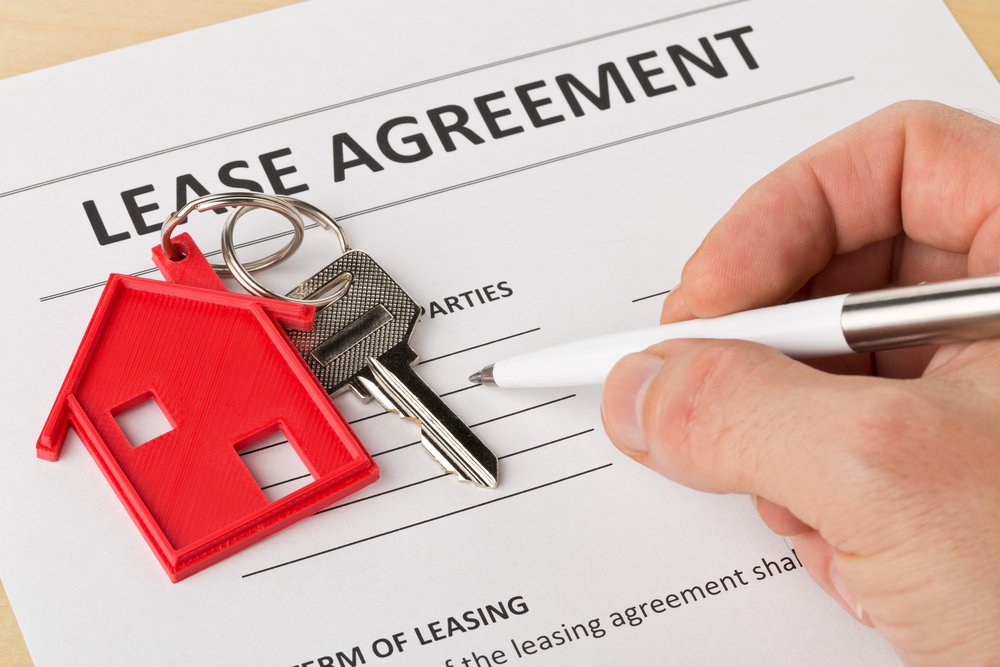Total Free Customer Care
Live Support?

“Rental property investment is a real estate strategy where individuals or businesses purchase properties with the intention of generating income through renting them out to tenants. It is a form of passive income generation and can also provide long-term financial gains through property appreciation.”
A short-term lease is a rental agreement between a landlord and a tenant for a relatively brief period, typically less than a year. These leases are common for situations requiring flexibility and are often used for temporary living arrangements, vacation rentals, or transitional housing.
A short-term or vacation rental agreement is a lease that is made between a landlord and tenant that is generally between one (1) to thirty (30) days. The agreement is most common for higher-end properties to outline the exact terms and conditions of the rental period. The agreement must follow all applicable State laws and if the housing structure was built before 1978 it must be furnished along with the Lead-Based Paint Disclosure Form.
Temporary Housing, Airbnb, VRBO or Vacation Rental are all terms to reference “Short-Term Leasing” which is a great space is a great place to start investing in real estate and is a great financial opportunity. If done well, you can not only turn a nice profit, but you can have your own personal vacation spot to use whenever you need to get away from the busy day-to-day hustle. You can use the location for special occasions like birthday parties or host holidays, and it pays to purchase a rental in an area you’ll enjoy getting away to.
A long-term rental refers to a property that is leased to tenants for an extended period, typically one year or more. It is a popular arrangement in both residential and commercial real estate, offering stability and predictability for landlords and tenants.
Owning a Short or Long-Term rental has its ups and its downs. Before considering owning one, you need to think about the advantages and disadvantages before making such a significant investment. First and foremost, keep in mind, rental property investments are not comparable to other interest bearing accounts, the stock market, mutual funds, cryptocurrencies such as bitcoin or other type of investment. They are their own animal and just like any other business need to be treated as such… like a business.
Owning rental property can be a lucrative investment and offer several advantages, including:
Rental properties provide a steady stream of income through rent payments, making it a reliable source of passive income once established. Yes, You can make an extra income, duh we know that, but just how much, right? This one is pretty straightforward. If you market your rental well across multiple host websites or if you ensure your rental is in a prime location, condition of property is in decent to new then you are sure to make a steady profit.
Over time, real estate often increases in value. This appreciation can result in significant financial gains if you decide to sell the property.
Rental property owners may be eligible for various tax deductions, including:
Real estate investments often allow you to use borrowed money (a mortgage) to purchase property, enabling you to acquire a valuable asset with less upfront capital.
Rental income typically increases over time, keeping pace with or exceeding inflation. Meanwhile, fixed mortgage payments remain constant, increasing profit margins.
Investing in rental properties adds a layer of diversification to your portfolio, reducing risk compared to holding only stocks or bonds.
Unlike other investments, rental property gives you direct control. You can make decisions about property management, tenant selection, rent pricing, and improvements.
As tenants pay down the mortgage, you build equity in the property. This equity can be used for future investments or as a financial safety net.
Rental properties can serve as a long-term investment, providing consistent income during retirement and acting as a valuable asset for your financial legacy.
You can increase the property’s value by making improvements or upgrades, allowing for higher rental income or increased resale value.
Beyond rental income, property owners may generate additional revenue through:
Owning property can provide a sense of accomplishment and pride while contributing to the community through well-maintained housing.
As the owner, you have control over rental pricing (within legal and market limits in some states such as CA), allowing you to maximize returns based on market conditions.
To most, having to actually manage the property yourself is the #1 disadvantage to most. In order to scale a Vacation Rental leasing business you will need to concentrate on growing and to do so you will need focus on growing by adding new doors (units) to your existing portfolio and the best way to maximize your time is simply by delegating off the actual hands on part of managing to a vetted property manager.
Characteristics of Long-Term Rentals:
For Landlords:
For Tenants:
For Landlords:
For Tenants:
| Aspect | Long-Term Rental | Short-Term Rental |
|---|---|---|
| Duration | 12 months or more | A few days to less than a year |
| Rent Cost | Lower monthly rates | Higher monthly rates |
| Furnishing | Typically unfurnished | Usually furnished |
| Tenant Turnover | Low | High |
| Target Audience | Families, individuals, businesses | Vacationers, temporary residents |
Long-term rentals are ideal for tenants seeking stable housing and landlords looking for dependable, steady income with minimal management needs.
Advertising your property is the number one focus to get your rental booked, and marketing your vacation rental to ensure it stands out is a must. Here are a few easy tips every vacation rental owner should read.
To effectively market your listing, you will want to ensure your property photos are of professional quality. Consider hiring a photographer. The investment is well worth it.
When writing your listing for your property, you will want to ensure it is SEO optimized. You can write and research on your own, or you can hire a writer with a background in SEO to help you ensure your listing is ranked high on prospective guests’ Google searches.
Advertise across all host sites and ensure you have all popular social media up and running. Consider hiring a social media manager to take the task off your hands, but you want to ensure your vacation rental social media is engaging and take the time to respond to inquiries and comments. Engagement creates intrigue.
To maximize your bookings, you will want to list your rental on one or as many sites to book out your place and maximize your earnings. The list of potential host sites continues to grow, and you should analyze each one and its fees before making your decisions.
Airbnb – One of the biggest vocational rental sites and the one more people review when planning out their vacations. This one charges the host 3% and the guests 14%.
Vrbo – They make it easy for vacation rental owners and property managers to advertise their properties and manage bookings online. Vrbo has acquired many vacation rental sites over the years and has quickly taken up the next spot where you should list your vacation rentals. Vrbo charges a listing fee that varies, guests are charged 6-12%, and hosts are charged on a pay-per-booking payment plan that starts at 8%.
Hotels.com – Listing on hotels.com or is perfect to cater to those guests who like to plan their vacations and are unsure if they want a hotel or a vacation rental. Hosts will pay a commission per booking that can vary on location. The fee averages about 10-25%.
Renter screening and background checks are essential steps in the rental process, offering property managers with crucial information to evaluate a potential tenant’s reliability and viability. By performing comprehensive assessments, property owners can minimize dangers, minimize future conflicts, and foster effective landlord-tenant relationships. Here’s an extensive take a look at the significance, procedures, and ethical considerations of occupant screening and background checks.
For property managers, choosing the right occupant can identify the success of their rental venture. Tenant screening helps to:
Background Examine Factors To Consider
When carrying out background checks, property managers must stick to legal and ethical guidelines to prevent discriminatory practices. Fair Housing Laws:
Federal laws, such as the Fair Housing Act, prohibit discrimination based on race, color, faith/religion, sex, disability, familial status, or national origin. Lots of states and municipalities have additional securities.
Permission
Landlords should obtain written permission from the candidate before running background or credit checks.
Privacy
Manage applicants’ individual details securely and restrict its usage to the screening process.
Customized Requirements
Use clear and consistent criteria to examine candidates, making sure choices are made objectively and fairly.
Tools and Providers for Tenant Screening
Many renter screening services offer detailed packages to streamline the process. Popular platforms include TransUnion SmartMove, Zillow Rental Supervisor, and RentPrep. These tools use personalized choices, consisting of credit checks, expulsion records, and criminal background searches.
Stabilizing Thoroughness and Fairness
While tenant screening is vital for threat management, property managers need to balance thoroughness with fairness. Avoid excessively stiff requirements that might exclude otherwise qualified occupants, such as small credit problems or older criminal offenses unassociated to current behavior.
Tenant screening and background checks are effective tools for landlords to make sure a successful rental experience. By executing a structured, legal, and ethical screening process, landlords can protect their investments, foster favorable occupant relationships, and maintain safe rental residential or commercial properties. For occupants, comprehending the screening process can help them prepare and provide themselves as desirable candidates, making the rental journey smoother for both parties.
Maintenance and upkeep of vacation rentals make owning a rental time-consuming and not to mention costs. You can’t cut corners with maintenance or care, and there are many things owners don’t consider when purchasing their properties. A few things that will need to be regular maintenance:
Housekeeping and appliance upkeep is the most essential upkeep you will need to manage. Most guests, when checking out, do not leave the place spotless, and you will want to ensure the house is cleaned thoroughly and sanitized.
A Vacation Home security system is beneficial for you and the guest’s safety. Invest in high-quality locks for the windows and doors and install security cameras with motion-activated lights. This protects your property from theft and assures your guests that you have their safety in mind. Don’t forget to have first aid kids, fire extinguishers, and smoke and carbon detectors on hand.
The outside appeal is just as important as the inside. Ensure your property is well taken care of and maintained. Clean the gutters as needed during the fall seasons, check for pest issues throughout the year, and repaint walls or surfaces as the need arises. If your property has amenities such as a pool or a hot tub, that takes a little extra care, such as changing the water and investing in a quality filtration system that needs to be checked at least weekly to ensure it’s working correctly.
Lease agreements are there to lay out the terms of the rental agreement and let the guest know what’s is and what isn’t acceptable at your vacation property. You’ll want to ensure you are covered and include thorough details on every term and condition listed. Never cut costs with your lease agreements and hire a lawyer as this is a legally binding document to ensure it’s drafted well to protect you.

There are some main components you will want to include in your leasing agreement, such as:
Financial Protections – You will want to include detailed information about costs, who is paying, damage and cancellation fees, and more.
Names, Dates, and Time of Rental – Include the names of the guests and the time of the occupancy of their stay. List your check-in and checkout times and arrange either key exchange or, if you have a code box, how they will receive the code safely.
List the House Rules – Ensure your rules are laid out, such as no smoking, noise restrictions, and even more minor things, such as ensuring dishes are washed or placed in the dishwasher before leaving.
Fees – If you have any optional fees for any amenities for your rental property, ensure you list them in your rental property leasing agreement.
Extended details on: vacation rental leasing. For a detailed look into many sites you can book with, Lodgify covers the most popular hosting sites catering to niches.
Income expectations
Vacation rentals and income can depend on a lot of factors. Your income can vary based on the size and location of the rental and times of the year or even how often it is booked.
You will want to ensure your listing has desirable amenities, fun trendy décor, and you want to try and impress your guests so they leave you positive reviews. The more positive reviews you have, the more likely you will attract more returning guests.
The only way to really be sure is to work hard to book your rental over the years and use that data to develop a forecast. Most vacation rental owners can make at least $10,000 annually, while some more significant income earners make 6 figures.
ROI
When purchasing a vacation, you will need to consider your return on investment or ROI. This is a metric investors use to determine the profitability versus costs of a property. This can be as simple as calculating expected annual income, subtracting the costs and expenses (cleaning fees, insurance, property taxes, etc.), and dividing that by the property’s total price.
When calculating ROI, you’ll want to consider a few factors to take into account. Ensure all numbers are accurate by having a detailed list of expenses and costs to include in your ROI.
You’ll likely need to account for the fact that your rental will not be booked every day of the year, so you will want to account for vacancies. If you opt for a loan, the lower you can manage to pay upfront, the higher your ROI will be for your rental upfront. Keeping detailed information and record keeping on Vacation Rental ROI is extremely important for long term rental success.
Income & Expenses
Owning a vacation rental can provide many tax benefits that people might overlook. As with any business, you want to ensure your income is maximized and your expenses are low. Your income relies heavily on what you spend, and your expenses add up as a vacation rental property owner. Most companies or people who have investment properties use a tax accountant. If you are unsure whether or not to use an accountant then speak with your attorney or ask a tax pro.
You have expenses such as:
routine maintenance and repairs
cleaning fees
salary for the cleaning and maintenance crews
property management fees
rental host site fees
insurances
marketing
general supplies, amenities, and furnishings
legal fees
Many of these expenses can be included in your tax breaks. Look for tax breaks in service fees. You may be able to deduct travel fees to your vacation rental if you perform repairs or maintenance, software, and tools that you pay for to manage your bookings and accounting.
Hire a tax professional who has experience collaborating with people who own rental properties to ensure you get all the tax breaks you deserve and maximize your potential earnings.

Location is truly everything in the world of real estate, and the same is especially true when you invest in a vacation rental. There are many places and tourist spots in the United States to consider when choosing your vacation rental. You will want to research and ask yourself if this is a place you would like to vacation?
When you purchase a place, try to purchase an area that meets one of these criteria:
Mountains – Many people love to visit the mountains year-round. The summer is great for camping and hiking, and in the winter, you’ll attract ski lovers
Beaches – Beach properties are one of the more desirable vacation rentals. When looking to book a vacation, many people look for a place to relax at the beach.
Desirable Weather – Find a place with warm weather year-round for guests to escape cold homes during the winter.
Parks and Attractions – You can’t go wrong finding a location near a theme park or major natural attraction. People tend to visit popular theme parks and wonders like the Grand Canyon all year.
Historical and Cultural Significance – You can choose a place with a strong history or even a variety of cultural significance that tourists love to see.
A fast turnover rate means more bookings and more potential earnings. When turning over your property, you have to have the ability to:
*If any repairs need to be done, try to get a repairman to complete the work before the next guests arrive to ensure all appliances and safety features are working properly. Streamline your turnovers by having a dependable team of maintenance workers or cleaning crew available to work quickly and efficiently.
When owning a vacation rental, you’ll have to decide if you want to hire a property manager or manage the property yourself. Both options have pros and cons to go with them, so you want to ensure you are doing what is best for you and your time and budget.
If you decide to take on property management on your own, this is a considerable time commitment. You will have to be available for phone calls to manage bookings, maintenance, and any emergency that might arise. Taking on property management on your own can help you build relationships with your guests and create happier guests more likely to return.
Hiring a property manager takes a log of the intricacies of managing the property off of your plate. You will hire a professional trained to manage guest inquiries, manage and book your rental, oversee all maintenance requests, and schedule cleanings as needed. A property manager is beneficial when you live far from the property. A property manager can reduce risk and assess damages quickly and efficiently.
Overall, hiring a good property manager helps you free up time to focus on other potential investments, spend time with your family, and focus on marketing your rental.
Vacation rentals are never recession-proof, but there are ways to ensure your rental stays afloat in a recession. Even in a recession, evidence shows people don’t stop taking vacations. They just might opt for shorter stays and book with multiple families, especially if your home is in a prime location.
If you can accommodate more tenants at a time (bunk beds or hideaway couches), you may see your rental bookings dip but not completely. You may want to consider offering long-term rentals that may be affordable options for people in between housing during the recession. Ensure the experience of your rental brings people in even during a recession.
Many people opt to travel with their pets these days and are often looking to find accommodations that will allow their furry friends to come along. Some risks come with opening up your rental to pets; however, you would be opening up your ability to book more guests with a pet-friendly stay.
Owning a vacation rental or Long-term rental is a worthy investment, but you want to do your due diligence and research to ensure you are not hit with unexpected expenses that could potentially set you back financially.
Learn everything you need to become a millionaire rental property investor. Create a realistic plan, know what is an incredible deal and not, analyze properties from commercial to residential, importance of team building, financing rentals to leverage more! Discover reasons why people fail from the initial price point of purchase, accounting, holding costs to importance of tenant retention and good maintenance service. Continue Reading…

